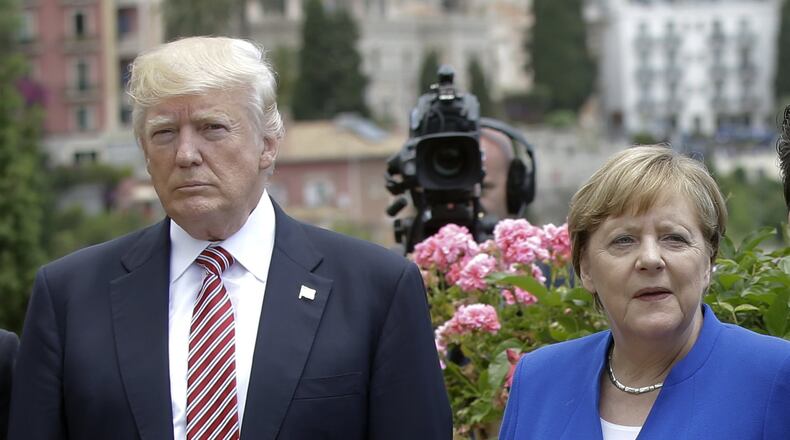Although Trump has surrounded himself with staunch internationalists such as Secretary of Defense James Mattis and White House National Security Adviser H.R. McMaster, the president has ritually undercut their efforts with his blunt criticism of lack of military spending by members of the North Atlantic Treaty Organization and trade policies of Germany and South Korea.
His actions have baffled and alarmed foreign policy analysts from both political parties, who cannot decide whether Trump has a coherent international strategy or is simply a novice who cannot grasp the subtleties of weighty international issues.
Richard Herrmann, director of the Mershon Center for International Studies at Ohio State University, said Trump “is stressing the main themes of America First that he pushed during the campaign.”
Those close to Trump dismiss such criticism as the dying gasps of a discredited establishment. They argue the United States has provided most of the money and soldiers to keep alive NATO while protecting Japan and South Korea and it is only fair those nations shoulder more of the burden.
They point out the foreign policy elite engaged in disastrous foreign wars in Iraq and pushed for a globalized economy which they contend has cost America millions of manufacturing jobs.
In an opinion piece last month in the Wall Street Journal, McMaster and Gary Cohn, director of the White House National Economic Council, insisted that “America First does not mean America alone.”
“We are asking a lot of our allies and partners,” they wrote. “But in return America will once again be a true friend to our partners and the worst foe to our enemies. The president’s visit” last month to Europe and the Middle East “showed the power of both competing to advance interests and engaging to develop relationships and foster cooperation.”
Such words have not re-assured U.S. allies and American foreign policy experts who fear an amateur is fiddling with an alliance structure that has kept the peace in Europe and much of Asia for seven decades.
Throughout the first century of the Republic, Americans preferred to avoid involvement with much of the world. But in the aftermath of World War II in which 405,000 U.S. soldiers died, American presidents and diplomats concluded that U.S. engagement was vital to prevent a Third World War.
“We are dealing with one of the most unprepared and intellectually non-curious presidents, so he lacks a basic understanding of history and understanding of U.S. engagement in the world,” said Carles Castello-Catchot, chief of staff of the Brent Scowcroft Center on International Security.
In particular, many were horrified that during his visit to Europe, Trump pointedly refused to assert that the U.S. would honor Article 5 of the NATO pact, which guarantees that an attack on one NATO member is an attack on the entire alliance. The only time NATO members invoked Article 5 was after the September 11, 2001 terrorist attacks in New York and suburban Washington.
Although Trump aides dismissed the omission as much ado about nothing, Politico.com reported last week that Trump deliberately dropped the mention of Article 5 from his prepared remarks, a move which stunned his national security advisers.
To Castello-Catchot the omission was ominous because U.S. support for “Article 5 was the final red line the Russians would never cross.” He said Trump’s move would not necessarily encourage Russia to gobble up the tiny Baltic states of Latvia, Estonia, and Lithuania, but could offer the Kremlin a “green light” for a more aggressive attitude in Europe.
“How many days can the Baltic states resist against Russian aggression?” Castello-Catchot asked. “One day? Maybe two?”
Other critics are not as sure that Trump is simply an isolationist. Marie Harf, a State Department spokeswoman during the Obama administration, said Trump “sees the world as a business and by that I mean there are winners and losers and the idea of cooperation to achieve things in our national security interests is completely foreign to him.”
“So I think in part he is making it up as he goes along because he doesn’t have a depth of knowledge on foreign policy issues and doesn’t seem to be listening to people like Mattis,” said Harf, now a Fox News contributor.
For now, some are trying to make the best of a muddled situation. On CBS’s “Face The Nation” this month, NATO Secretary General, Jens Stoltenberg said “the U.S. is now increasing their military presence in Europe for the first time since the end of the second—the Cold War.”
Stoltenberg pointed out Trump “just suggested a 40% increase in funding for U.S. military presence in Europe… . So actions speak louder than words. And we see now actions, meaning increased U.S. presence in Europe.”
Herrmann at Ohio State appears to agree, saying international affairs “seems like a two-level game” to Trump. “He’s got a domestic audience and a foreign audience and he seems to be parading to his domestic audience and hoping his professionals will iron it out.”
About the Author
